
Swiss poultry ban comes into effect

A ban on keeping poultry outdoors came into force in Switzerland on Tuesday, but breeders and owners have another week before the authorities crack down.
Meanwhile, retailers have reported a sizeable drop in poultry sales as a result of the health scare.
The ban on keeping domestic fowl outdoors, which follows similar action taken in neighbouring Germany and Austria, runs until December 15. The authorities have called the measure “a precautionary step”.
The rationale behind the move is to protect indigenous flocks from possible contamination by migratory birds, currently making their way to Switzerland for the winter. The fear is that these birds could be potential carriers of the H5N1 avian flu virus.
The Swiss authorities have also ordered all poultry to be registered.
Guidelines
On Monday the Federal Veterinary Office and the cantons drew up guidelines to help smooth the introduction of the ban.
The aim was to harmonise measures against the spread of avian flu, which has reached parts of Europe.
Breeders and owners have been told they have to protect their animals from contact with migrating birds until December 15. They have until the end of the week to advise the authorities of the status of their flocks.
Possible exceptions to the ban, such as for farmers who cannot confine their birds, were discussed. But only some owners of emus, ostriches, geese and ducks might see the restrictions lifted by the cantons.
The cantons are responsible for ensuring that the rules are adhered to. Fines – worth up SFr20,000 ($15,700) – will however not be imposed for another week, giving the authorities time to warn all those involved.
On Monday retailers announced that weekend sales of poultry had dropped by 20 per cent. Products carrying the free-range label have suffered the most, it was reported.
Poultry imports
Switzerland has already banned poultry imports from countries affected by avian flu, including Turkey and Romania.
Other precautions include guidelines for poultry farmers, increased border checks and a monitoring programme for wild birds.
The Swiss authorities insist they are well prepared for bird flu and are bracing themselves for the worst case scenario of a highly contagious human strain of the virus.
They have been stockpiling enough supplies of an anti-viral drug for two million people. However, officials say there is no reason for panic.
swissinfo with agencies
The H5N1 strain first emerged in Hong Kong in 1997, when it caused the death or destruction of 1.5 million birds. Eighteen people fell ill, of whom six died.
It re-emerged in 2003 in South Korea and has spread to several Asian countries including China, Vietnam, Cambodia, Thailand, Laos and Indonesia.
It has also appeared in Russia and Kazakhstan, and recently in Turkey, Romania, Croatia and Britain.
So far H5N1 has killed at least 60 people.
The Swiss government announced the ban last Friday as a way of preventing the transmission of avian flu via migratory birds. It will stay in force until December 15.
Similar bans have been imposed in Germany and Austria. Poultry markets and shows have also been stopped until mid-December, which is the end of the migration season for birds from eastern Europe.

In compliance with the JTI standards
More: SWI swissinfo.ch certified by the Journalism Trust Initiative



























You can find an overview of ongoing debates with our journalists here . Please join us!
If you want to start a conversation about a topic raised in this article or want to report factual errors, email us at english@swissinfo.ch.